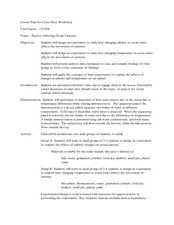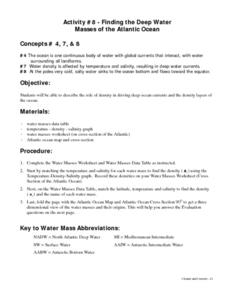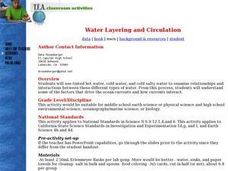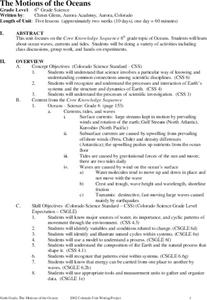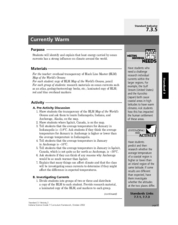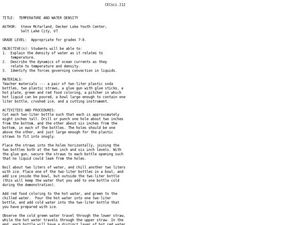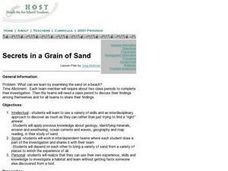Curated OER
Lesson Plan #3 ~ Ocean Currents
Sixth graders experiment to understand the ocean's currents. In this ocean current activity, 6th graders complete an experiment with two bottles of water and an index card to discover information about the ocean current. ...
Curated OER
Round and Round
Learners interpret data from a three-dimensional array of current monitors to determine an overall pattern of water circulation. They hypothesize what effect an observed water circulation pattern might have on seamount fauna. A very...
Curated OER
Upwelling in the World Ocean
Here is a fascinating topic: the upwelling of ocean waters. Oceanography pupils learn what mechanisms cause upwelling, types of upwelling, and the effects on marine life. Colorful satellite imagery and informative diagrams bring this...
Curated OER
NUMB3RS Activity: Where’s the Source? Episode: “Undercurrents”
Several real-world problems are posed as a way to learn about vector fields in order to make some predictions after analyzing the data. The main problem comes from the tv show NUMB3RS and is based on solving a crime where a body has...
Curated OER
Factors Affecting Ocean Currents
Students design and conduct an experiment to determine the effect of salinity and temperature changes in the movement of ocean currents. In this earth science lesson, students record observations and collect data. They share their...
Curated OER
Rubber Duckies and Ocean Currents
Students explore marine life by conducting a rubber duck experiment. In this water currents lesson, students practice identifying latitude and longitude coordinates on a map and define the currents of major oceans. Students discuss the...
Curated OER
Ducks in the Flow: Resources about Surface Ocean Currants for the Upper Elementary Classroom
Students investigate surface ocean currents. In this oceanography lesson, students work in small groups to create models that demonstrate surface currents, the Coriolis Effect, and how surface currents move debris. This lesson includes a...
Curated OER
Finding the Deep Water Masses of the Atlantic Ocean
Students describe the role of density in driving deep ocean currents and the density layers of the ocean. They determine that the ocean is one continuous body of water with global currents that interact, with water surrounding all...
Curated OER
Water Layering and Circulation
Students examine relationships and interactions between different types of water. They experiment with colored water of different temperature and salinity and discuss how the results relate to real ocean currents.
Curated OER
The Motions of the Oceans
Students examine the topics of ocean waves, currents, and tides. They locate and label ocean currents on a world map, conduct experiments, analyze key vocabulary, view demonstrations and record the data, and complete handouts.
Curated OER
Currently Warm
Seventh graders investigate how ocean currents affect climate. In this earth science lesson, 7th graders draw and label the current in their assigned ocean. They discuss how currents from the poles differ from the equator.
Curated OER
Immersion Presents Monterey Bay
Students study Monterey Bay. In this Monterey Bay instructional activity, students create a model of upwelling around Monterey Bay. Students simulate surface water movement relative to prevailing winds.
Curated OER
How Temperature Affects Density
Students examine the effects of temperature and density in ocean currents. In this density lesson, students explain how coastal climates are impacted by ocean currents. They investigate how the ocean currents are affected by temperature...
Curated OER
Ocean Currents
Students examine ocean currents. In this investigative lesson, students examine ocean currents and the relationship between the ocean, our atmosphere, and the weather. They will create a model of an ocean current.
Curated OER
Ocean Currents
Young scholars determine how water and wind affect ocean currents. In this science investigation lesson, students follow the provided steps to enable them to consider how explorers may have used ocean currents to their advantage.
Curated OER
Temperature
In this temperature worksheet, students conduct an experiment including water, measuring cups, a funnel, and more, to see how temperature affects ocean currents. Students read 5 directions and answer 7 questions.
Curated OER
Ocean Currents Quiz
In this ocean worksheet, students complete a 13 question multiple choice on-line interactive quiz about ocean currents. Prior knowledge is assumed.
Curated OER
Ocean Currents Word Search
In this science worksheet, students find the terms that are related to the ocean currents and the answers are found by clicking the link at the bottom of the page.
Curated OER
Driving Currents
Students conduct a variety of investigations to see how water, heat, and salinity affect the flow of the world's ocean currents,as well as, explore many factors that affect the flow of the world's ocean currents. They also describe in...
Curated OER
Ocean Currents
Fourth graders work in groups to research ocean currents and create posters with their findings. They locate the patterns and names of major ocean currents and identify them on a map. Students also use red pencil to show ocean currents...
Curated OER
Temperature and Water Density
Middle schoolers consider the effects of temperature on water density. In this Earth Science lesson, students evaluate a demonstration of cold and hot water currents in a model. Middle schoolers use two liter bottles and varied water...
Curated OER
Learning Lesson: How it is Currently Done
Learners create their own ocean currents by using everyday items. They examine the constant pushing of molecules that makes us feel wind. They discuss how the water moves in the Southern Hemisphere.
Curated OER
Estuarine Currents
Learners explore an estuarine system to gather data on density driven currents. This type of current is contrasted with temperature and wind driven currents.
Curated OER
Secrets in a Grain of Sand
Young scholars working in small groups examine beach sand to discover signs of erosion, weathering, ocean currents and waves. They present their findings to the class.






